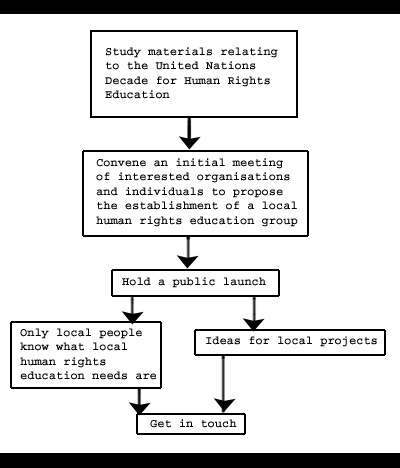|


The Human Rights Educators
Starter Kit
The Purpose of This Kit.
The aim of this kit is to provide some key ideas to help
individuals and community organisations to establish local
human rights education activities. The materials have been produced
by the National Committee on Human Rights Education, which
has been designated as Australia's national focal point for
human rights education.
What is Human Rights Education?
Many of us would like to contribute to a community that is
more caring, more united, more just, more tolerant and more
understanding. We are also looking for ways we can make a
difference. The struggles we face today are the same ones
that the world has faced since the adoption of the Universal
Declaration of Human Rights in 1948.
Human rights education aims to make the Universal Declaration
real and effective in our everyday lives.
Human Rights Education can include any activity which increases
awareness of and understanding of human rights. "Education"
is a broad term and includes activities in schools, community
and the workplace. Individuals, community organizations, businesses
and government bodies can all contribute to human rights education.
Human Rights Education includes:
· "knowledge" - information about human rights;
· "values" - attitudes and beliefs which
uphold human rights; and
· "action" - giving people the tools and
encouragement to be effective defenders of human rights.
What are Human Rights and Who Has Them?
We sometimes think about human rights as applying to other
people and other countries. In fact, we all have human rights
and each one of us can play a role in upholding human rights.
Human rights are the basic minimum standards of individual
and community that make societies happy and caring places
to live. Human rights include the ideas:
· That we are all equal members of one human family
that should care for each other.
· We should all treat each other fairly and equally
without regard to our race, colour, sex, language or religion
or other status.
· We all have the right to safety, to life and to freedom.
· We should all have the same rights and to the protection
of the law.
· We all have the right to family.
· We all have a right to work and to an adequate standard
of living and to access to education and health.
· We all have responsibilities to the community.
The United Nations and Human Rights Education.
1995-2004 was designated by the United Nations General
Assembly as the UN Decade for Human Rights Education. The
aim of the Decade is to promote human rights around the world
by improvement of education about human rights. As part of
the Decade the United Nations has adopted a "Plan of
Action" which can be implemented at international, regional,
national and local level.
Some things you can do at local level to advance human rights
education include:
· Getting together a group of people or organizations
committed to working on human rights education initiatives.
· Discussing human rights issues as they relate to
the local community - defining the needs - look at what human
rights education might already be happening.
· Make sure your community has a good celebration of
Human Rights Day on 10 December every year.
· As a group, and in cooperation with others such as
schools, business and local government, develop and implement
human rights education programs.
Local Human Rights Education
Starter
Flow Chart

|